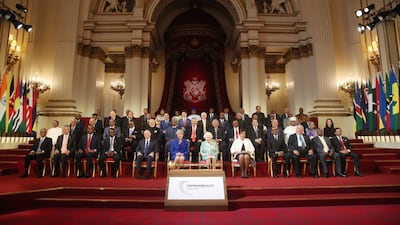Queen Elizabeth II formally opened the Commonwealth Heads of Government Meeting at Buckingham Palace on Thursday, a lavish two-day affair that will see the 53 heads of state and senior foreign ministers discuss cyber security, trade and environmental concerns.
Dignitaries are also expected to name the Queen’s successor on Friday, although Prince Charles is widely tipped to be the front-runner.
The leadership discussions come amid a wider debate, however, about whether the Commonwealth should transform into a global leader on health, education and the environment, or whether the ageing and bureaucratic institution has already outlived its usefulness.
“It has almost become the modern equivalent of a medieval monastery, and Commonwealth heads of government meetings have almost become medieval pilgrimages. The leaders get together and pray for things,” Philip Murphy, director of the University of London's Institute of Commonwealth Studies, told the BBC.
The forum represents the views of 53 nations who share a common legal system, from sprawling India, Canada and Australia to tiny Tuvalu. Some argue that the group’s diversity and demographics – the Commonwealth nations represent a population of 2.4 billion with 60 per cent of those people under the age of 30 – should be used as a springboard for change.
“As a figurehead I think the Queen is great, but I do think in this post-Brexit time we could probably do a lot more together as countries – a third of the world’s population, a third of the nations, etc. – I think we could do a lot more,” Evening Standard royal editor Robert Jobson said.
Prime Minister Theresa May hopes to use the London summit to encourage heads of government to join Britain’s fight to improve the environment. The UK is considering banning cotton buds, plastic drinking straws and single-use plastics in England starting in 2018, part of a larger campaign to halt pollution of the world’s rivers and oceans.
“The Commonwealth is a unique organisation with a huge diversity of wildlife, and environments, so it is vital we act now,” the prime minister told dignitaries on Thursday, urging all Commonwealth countries to participate.
_____________
Read more
Queen endorses Prince Charles as future Commonwealth leader
Relatives of Iranian prisoners push Commonwealth for help
_____________
Prince Charles, whose passion for the environment is well known, made his own pitch to the heads of state, reminding them about the ties that have bound the nations since 1952 when the Queen became head of the Commonwealth.
“I pray that this Commonwealth Heads of Government Meeting will not only revitalise the bonds between our countries, but will also give the Commonwealth a renewed relevance to all citizens, finding practical solutions to their problems and giving life to their aspirations,” Prince Charles said.
Even if the Prince of Wales is named as the Queen’s successor on Friday however, the Commonwealth nations face another hurdle that could stall any lofty goals: money.
Britain, Australia and Canada still pick up the big bills for the Commonwealth’s activities, which including educational programs and election monitoring. But the Commonwealth’s budget is being trimmed back every year, and activities along with it.
“I think one of the issues is how do you do more for less? And that is something everybody is now having to do. And it makes you innovative. People are always telling me you have no money. To which my answer has usually been ‘And your point is?’” Commonwealth Secretary-General Patricia Scotland told the BBC.
But Baroness Scotland also ended the interview with a pitch for more money from Commonwealth members.
The 53 heads of state, foreign minister and officials were greeted at Buckingham Palace on Thursday by 101 soldiers and a drum corp. They were also welcomed with flags from every nation.
On Friday, the talks move to Windsor Castle for the formal end of CHOGM and a statement expected to rubber stamp Prince Charles as the new head of the Commonwealth. Beyond that though, the future is uncertain.
University professor Philip Murphy, writing in The Guardian, compared the group to "a grandfather clock that has been in the family for generations. It hasn't told the right time for decades, but no one has the heart to take such a treasured heirloom to the tip."

